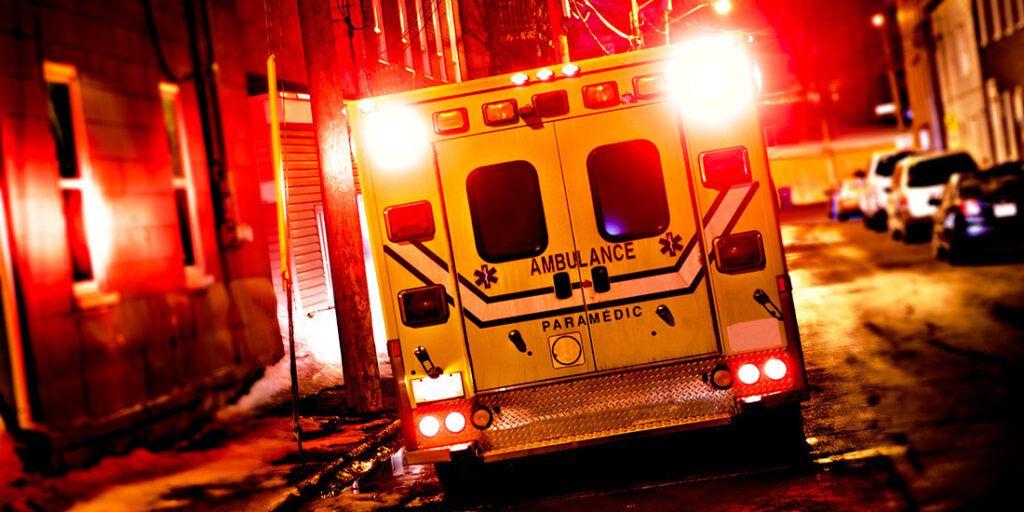HOSPITALS

Understanding Service Dogs: What First Responders Need to Know
- Susan Cohen
Service dogs do far more than guide or retrieve—they are medical equipment, trained to monitor, alert, and even intervene during a health crisis. For first responders, understanding these working dogs can mean the difference between life and death.
Most Recent

A Holistic Strategy for Responders’ Well-Being
Camilo Olivieri
May 7, 2025
First responders and emergency managers face constant, high-pressure stress from trauma, long hours, and critical decisions. This often leads to chronic stress, increasing risks of heart disease, mental health issues, and substance abuse. Their ability to help others depends on prioritizing their own well-being through proactive self-care.

Elevating Healthcare Emergency Preparedness Exercises with Realistic Patient Simulation
Kathryn Romanchuk and Ben Kobliner
February 19, 2025
Overlooked until disaster strikes, many emergency management departments struggle with personnel and budgetary constraints, yet the demand placed on these departments continues to increase. Nevertheless, hospitals and health systems need to be prepared, and full-scale exercises are a comprehensive method for achieving this preparedness.

Back to the Basics: Navigating Crisis Leadership
Andrew Pence
February 19, 2025
From historic catastrophes to today’s challenges, crises pose significant public threats. By returning to the basics and prioritizing deliberate preparation, organizational leaders can build greater resilience, enhance performance, and lead effectively when it matters most.

U.S. Withdrawal from the World Health Organization: Emergency Preparedness Implications
Tanya M. Scherr
February 12, 2025
As the U.S. contemplates withdrawing its membership from the World Health Organization, there are potential impacts on both local and global emergency preparedness and response to consider. Emergency managers should evaluate their current programs to determine ramifications in their local sectors.
Hospitals Archives
Growing Foreign Threats to National Security, Part 2: Emergency Management Approaches and Choices
Glen Woodbury
October 30, 2024
This is Part 2 of a two-part article that explores the nation-state threat and its implications for the emergency management community regarding the operations, resilience,
Growing Foreign Threats to National Security, Part 1: Challenges and Considerations
Glen Woodbury
October 23, 2024
Part 1 of a two-part series explores the nation-state threat and its implications for the emergency management community, regarding the operations, resilience, resourcing, strategies, and
National Laboratory Partnerships: Linking Operations and Research
Ryan Eddy and Ann Lesperance
September 25, 2024
The September 11 terrorist attacks in 2001 spurred a pivotal change in the way the U.S. approaches preparedness for threats to the homeland. In recognition
Responder Fatigue: A Growing Concern
Dan Scherr and Tanya M. Scherr
September 18, 2024
Emergencies require immediate action by people trained to extinguish fires, treat injuries, protect the public, and perform other life and safety tasks. Responders who repeatedly
AI and 911 Call Systems: A New Ally or a Hidden Risk?
Michael Breslin
September 11, 2024
From natural disasters to sophisticated cyberthreats, the risks to public safety are evolving fast. As unexpected events can strike at any moment, the systems designed
Vulnerability and Exploitation: Human Trafficking After Natural Disasters
Benjamin Thomas Greer and Nathan DiPillo
August 28, 2024
Disasters inherently come with known and unknown threats. One looming emerging threat is human trafficking because traffickers capitalize on the vulnerability these events create to
Follow Us
Get Instant Access
Subscribe today to Domestic Preparedness and get real-world insights for safer communities.
HOSPITALS
Most Recent

Nonmedical Concerns for Hospitals in a Mass-Casualty Incident
Joanmarie Verrico Wallster and Michael Prasad
January 22, 2025
Nonmedical concerns such as security and safety, unaccompanied minors, and governmental relations can adversely impact a hospital when responding to

The Current State of the Opioid Crisis & Other Emerging Threats
John Johnson
January 22, 2025
Opioid deaths have surged dramatically since the pandemic. Manufacturers exploit legal loopholes and use precursor chemicals that often evade detection

Preparing for the Next Biothreat: Lessons Not to Forget
Christy Anderson
January 15, 2025
In 2024, senior officials from hospitals, healthcare organizations, public health, emergency management, and other responder communities convened at two workshops

Mission Ready Packages: New Possibilities
Kay C. Goss
January 15, 2025
In 2005, the Superdome in New Orleans served as a mass shelter and accommodated over 25,000 people during Hurricane Katrina.
Hospitals Archives
The Key Bridge Collapse – Through the Lens of Community Lifelines
Michael Prasad
July 17, 2024
The eight major elements of Community Lifelines use traffic-light-type color-coding to categorize the adverse impact status of a disaster. The article’s author has applied this
Five Key Domains of Incident Management
Aaron Clark-Ginsberg
July 10, 2024
Effective incident management is a set of activities, not policy box-ticking of doctrine that may or may not be followed. A new free toolkit based
Jane Doe – Responding to Vulnerable Patients
Catherine L. Feinman
June 26, 2024
Despite the prevalence of first responders encountering human trafficking victims, they are not always aware of the signs or proper handling of the situation to
A Modern Take on an Age-Old Biological Weapon
Raphael M. Barishansky
June 12, 2024
Reports about North Korea launching balloons filled with fecal matter and propaganda into South Korean territory were intriguing. However, this incident raises public health concerns
Shielding Communities: Public Health Strategies for Natural Hazards
Raphael M. Barishansky and Andrew D. Pickett
May 15, 2024
Public health risks are common concerns when natural hazards occur. However, history shows that the increasing frequency of events and growing population sizes have been
Primary Care Investments to Increase Community Resilience
Angie Im
April 17, 2024
Community health centers are medical lifelines for millions of Americans. However, financial constraints and healthcare workforce challenges strain these critical resources. New initiatives and additional
Follow Us
Get Instant Access
Subscribe today to Domestic Preparedness and get real-world insights for safer communities.


